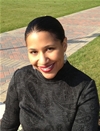B.A. Sociology, Morgan State University, 2000
M.A. Anthropology, Brown University, 2002
Ph.D. Anthropology, Brown University, 2007
Courses Taught:
Introduction to Anthropology; Introduction to Sociology; Sociological Writing; Social Problems; Sociocultural Anthropology; Language and Society; Introduction to Archaeology; Forensic Anthropology; Ethnographic Methods; Applied Anthropology; Anthropological Theory; Ethnography of the Eastern Shore; Race, Education and Social Inequality (graduate course); Sociology of Baltimore (graduate course); Urban Sociology (graduate course). *Coordinator Anthropology Concentration
Research Interests:
African American identity, African American institutions, educational institutions, popular culture
Publications:
"Community Participation and Empowerment." In The Hill Community Small Area Plan, edited by Mary Ann Akers, Easton, MD, 2014.
Raised Up Down Yonder: Growing Up Black in Rural Alabama. Jackson: The University Press of Mississippi, 2013.
"Anselme Remy: Native Anthropologist and Scholar Activist Engaged in an Anthropology of Liberation." Book Chapter in The Next Generation of African American Anthropologists after the Pioneers. Under Review, The University of Illinois Press.
"Decolonization Continued: Anthropology and HBCUs" coauthored with Elgin Klugh. June 2013. Association of Black Anthropologists News Column. Anthropology News.
"Our National Obsession with Toddlers and Tiaras." Anthropology Now. 5(1): 85-92, 2013.
"President-elect Obama: His Symbolic Importance in His Own Words." Journal of African American Studies 13(2): 187-189, 2009.
As a cultural anthropologist and associate professor at Morgan State University, I coordinate our Department's Anthropology Concentration. In fact, developing bright young undergraduate students is my greatest professional joy.
My book, Raised Up Down Yonder: Growing Up Black in Rural Alabama, (Margaret Walker Alexander Series in African American Studies, University Press of Mississippi, 2013) attempts to shift focus away from why black youth are "problematic" to explore what their daily lives actually entail. I spent 15 months in the small community of "Hamilton," Alabama, to investigate what it is like for a young black person to grow up in the contemporary rural South. What I found was that the  young people of Hamilton are neither idly passing their time in a stereotypically languid setting nor are they being corrupted by hip-hop culture and the perils of the urban North. Rather, they are dynamic and diverse young people making their way through the structures that define the twenty-first-century South. Told through the stories of several high school students, the project reveals a group that is often rendered invisible in society. Blended families, football sagas, crunk music, expanding social networks, and a nearby segregated prom are just a few of the fascinating juxtapositions.
young people of Hamilton are neither idly passing their time in a stereotypically languid setting nor are they being corrupted by hip-hop culture and the perils of the urban North. Rather, they are dynamic and diverse young people making their way through the structures that define the twenty-first-century South. Told through the stories of several high school students, the project reveals a group that is often rendered invisible in society. Blended families, football sagas, crunk music, expanding social networks, and a nearby segregated prom are just a few of the fascinating juxtapositions.
My most recent research has been applied in nature. From 2013-2015, I was part of a transdisciplinary team, which included architects, historic preservationists, landscape architects, sociologists, and planners, that helped to create A Small Area Plan for "The Hill Community" on the Eastern Shore of Maryland. This community is notable for its history; historians and archaeologists believe that "The Hill" will be proven to be the oldest continuously inhabited community of African Americans in the country. I showcased my work on that project in an installation at the 2014 AAA Annual Meetings in Washington, DC.
Regarding professional service, from 2012-2014, I served as Secretary/ Treasurer of the Association of Black Anthropologists. In that role, I helped to plan the Annual ABA meetings, worked to ensure that the budget was balanced, and kept accurate and thorough records. I truly enjoyed the experience of working with my colleagues from around the country.
I continue to be fascinated by African American institutions, such as Historically Black Institutions, and their role in fostering community stability, positive identity, social networks, and opportunities for upward mobility. Thus, I continue to work on projects that examine the relevance of Anthropology at HBCUs as well as explore African American pioneers in Sociology and Anthropology. Further, I am privileged to have been asked to co-coordinate The Benjamin A. Quarles Humanities and Social Science Institute Undergraduate Scholars Program in Interdisciplinary Perspective on the African-American Legacy, funded by the Andrew W. Mellon Foundation.


